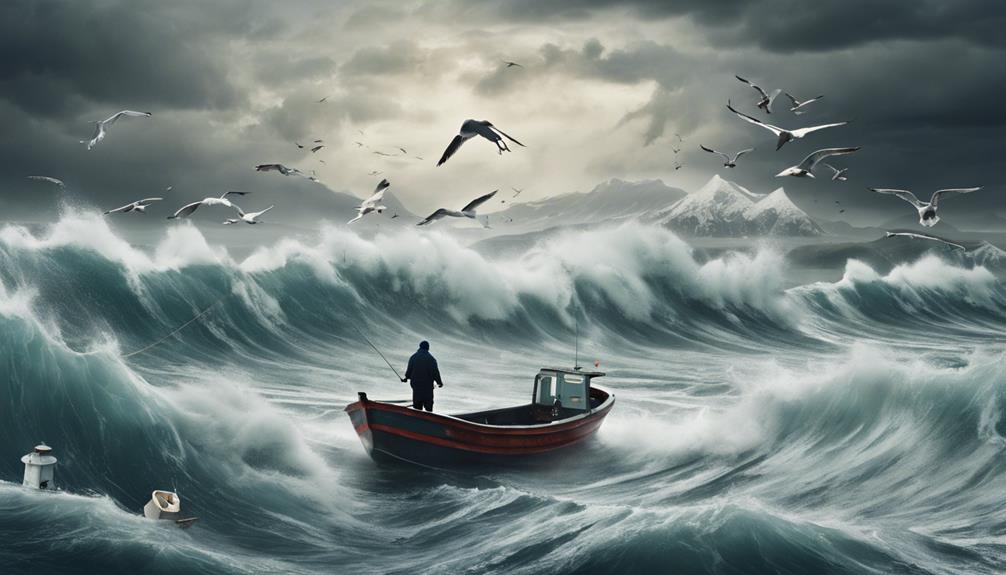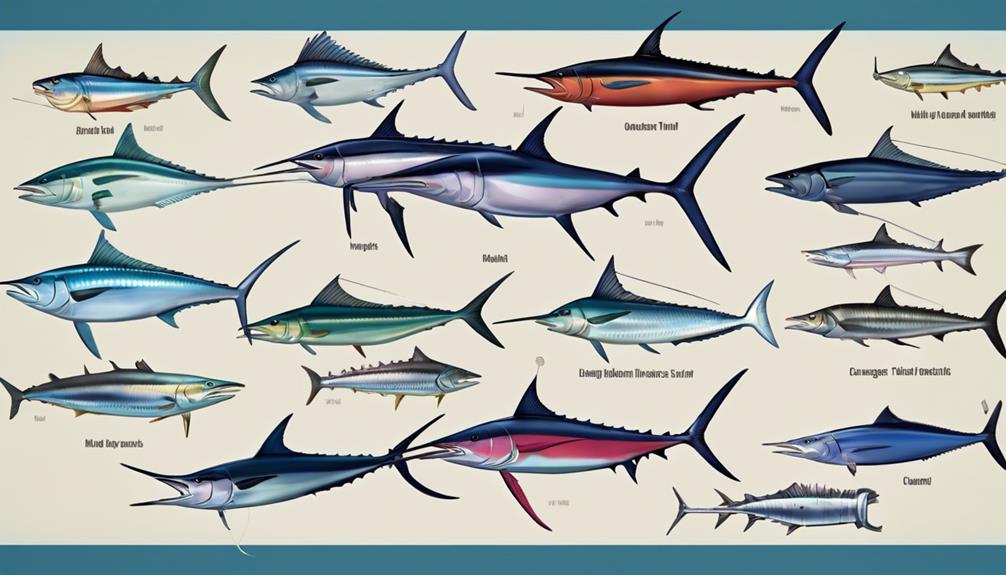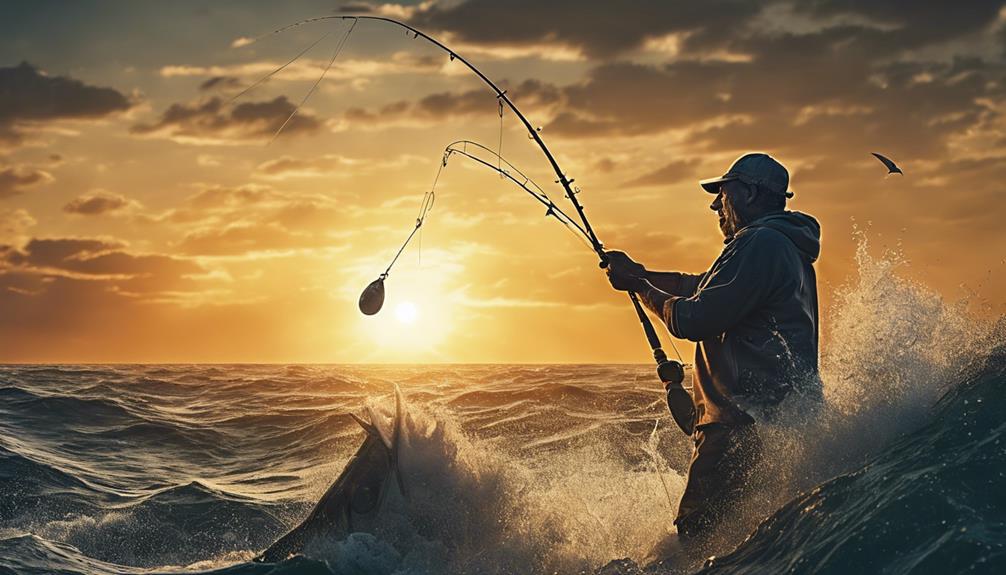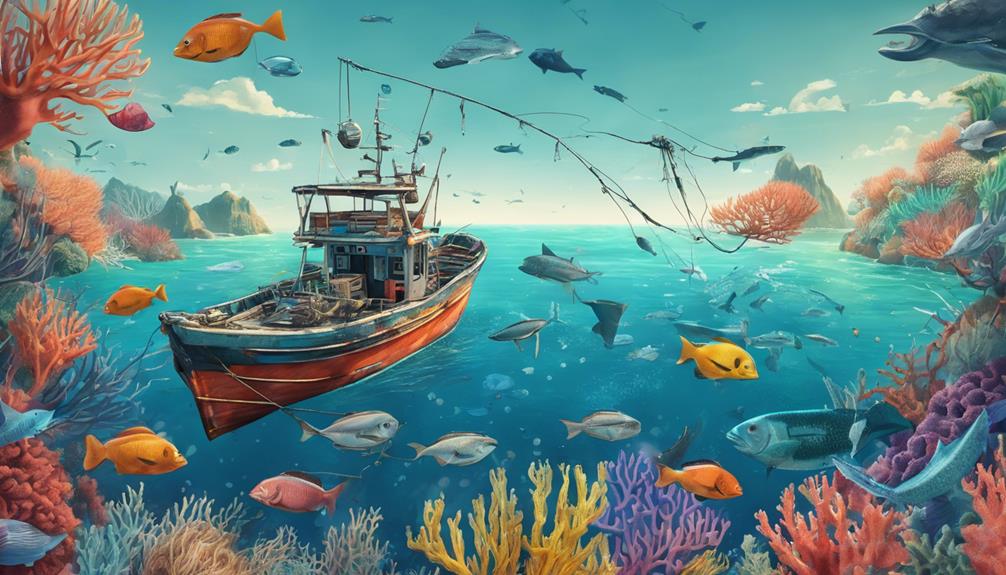Imagine the sheer vastness of the ocean compared to the confined waters of a tranquil lake. The differences between lake fishing and deep-sea ventures extend beyond just the size of the fishing grounds.
From the depths of the water to the types of fish you might encounter, each aspect presents its unique challenges and rewards. As you consider which fishing experience to pursue, keep in mind the various factors that set these two environments apart and how they could influence your next angling adventure.
Size of Fishing Grounds
When comparing lake fishing to deep-sea ventures, the size of fishing grounds significantly impacts the overall fishing experience. In lake fishing, accessibility is a key factor. Lakes are often easily reachable by car, requiring minimal travel time and effort. This accessibility makes it convenient to enjoy a quick fishing trip without extensive planning or equipment.
On the other hand, deep-sea fishing offers a vast variety of species due to the expansive size of the fishing grounds. The open ocean provides a diverse range of fish, from marlins to tuna, creating an exciting and unpredictable fishing experience.
The benefits of ground size are evident in both lake fishing and deep-sea ventures. In lakes, the smaller size of fishing grounds can lead to more concentrated fish populations. This means that anglers have a higher chance of catching fish in a specific area, enhancing the overall fishing efficiency.
Conversely, the vast size of deep-sea fishing grounds offers unparalleled variety. Anglers can explore different locations within the same trip, targeting various species and adapting to changing conditions.
Depth of Water
In both lake fishing and deep-sea ventures, the depth of water plays a crucial role in determining the type of fish species you can encounter. The varying depths offer unique challenges and opportunities for anglers seeking their next catch.
- The underwater terrain can shift dramatically with depth, creating a sense of mystery and excitement as you explore what lies beneath the surface.
- Oxygen levels fluctuate at different depths, impacting where fish congregate and how they behave, adding an element of unpredictability to your fishing experience.
- Fishing techniques need to be adapted based on the depth of the water, requiring you to adjust your approach to reel in that prized catch successfully.
- Visibility levels can change significantly with depth, from crystal clear waters in shallow areas to murky depths where shadows lurk, intensifying the thrill of the hunt.
- Deep waters hold the promise of encountering elusive species that reside in the dark abyss, fueling your sense of adventure and the desire to uncover hidden treasures below.
Navigating the depths in both lake fishing and deep-sea ventures demands skill, patience, and a willingness to embrace the unknown. As you delve into the waters, remember that the depth not only defines your surroundings but also shapes the essence of your fishing journey.
Types of Fish
Exploring the underwater world in both lake fishing and deep-sea ventures reveals a diverse array of fish species awaiting your discovery. In lake fishing, you'll encounter various types of fish exhibiting distinct behaviors that influence your fishing techniques. Understanding the seasonal patterns and fish migration can significantly enhance your fishing success. For instance, during the spring spawning season, many freshwater fish species like bass and trout are more active near the shores, making them easier to catch using lures or bait that mimic their natural prey.
Conversely, deep-sea ventures offer a different set of fish species that have adapted to the vast ocean environment. Here, you may encounter pelagic fish such as tuna and marlin known for their strong migratory patterns. These fish often travel long distances, following the warm ocean currents or seeking abundant food sources. To catch these deep-sea dwellers, specialized fishing techniques like trolling or deep-drop fishing are commonly used to target specific species at different depths.
Whether you prefer the tranquility of lake fishing or the thrill of deep-sea adventures, being aware of the types of fish you may encounter, their behaviors, and the appropriate fishing techniques can significantly improve your chances of a successful and enjoyable fishing experience.
Fishing Equipment Needed
To gear up for successful fishing outings, ensure you have the essential equipment ready and in good condition. When heading out for a fishing adventure, the right gear can make all the difference. Here are five crucial items to consider:
- Quality Fishing Rod: A sturdy fishing rod is essential for mastering different fishing techniques. Invest in a rod that matches the type of fish you aim to catch and the fishing environment you'll be in.
- Versatile Tackle Box: A well-stocked tackle box is vital for successful fishing trips. Ensure you have a variety of hooks, sinkers, bobbers, and lures to accommodate different fishing conditions and techniques.
- Assorted Bait Selection: Having a diverse range of bait options increases your chances of attracting various fish species. Experiment with live bait, artificial lures, and natural baits to see what works best.
- Proper Casting Reel: Improving your casting skills can significantly impact your fishing success. Choose a casting reel that suits your experience level and the type of fishing you plan to do.
- Comfortable Fishing Gear: Don't overlook the importance of comfortable fishing gear. Dress appropriately for the weather conditions, wear suitable footwear, and consider investing in a good quality fishing chair for long hours by the water.
Weather Conditions
Considering the weather conditions is crucial for planning a successful fishing trip. Before heading out, make sure to check the forecast and take necessary safety precautions. Pay attention to the water temperature as it can affect the fish behavior. Dress appropriately for the conditions, and always carry extra layers in case the weather changes suddenly.
When it comes to boat size, the weather plays a significant role. In rough conditions, a larger boat provides more stability and safety. Ensure your boat is equipped with all the necessary safety gear, such as life jackets and a first aid kit. Regular maintenance of your boat is essential, especially before embarking on a deep-sea fishing adventure. Check the engine, fuel levels, and navigation equipment to avoid any mishaps while out on the water.
As for gear maintenance, the weather can impact the longevity of your equipment. Saltwater can be corrosive, so rinse your fishing gear with freshwater after each trip. Check your reels, lines, and hooks for any signs of damage and replace them if needed. Proper maintenance ensures your gear functions correctly when battling those big ocean fish. By staying prepared and considering the weather conditions, you set yourself up for a safe and successful deep-sea fishing experience.
Duration of Fishing Trips
Checking the weather conditions is crucial for planning a successful fishing trip, and now let's shift our focus to the duration of fishing trips. When deciding on how long your fishing expedition will be, several factors come into play that can significantly impact your overall experience:
- Travel Time: Consider the time it takes to reach your fishing destination. Long travel times may eat into your actual fishing time, so plan accordingly to maximize your experience on the water.
- Time Commitment: Fishing trips can range from a few hours to several days. Determine how much time you can dedicate to the trip to ensure you have enough time to enjoy the experience fully.
- Preparation Needed: Longer fishing trips often require more extensive preparation. You'll need to pack more supplies, food, and gear to sustain you throughout the trip.
- Gear Required: Depending on the duration of your fishing trip, you may need different gear. Short trips may only require basic equipment, while longer expeditions might necessitate specialized tools and provisions.
- Rest and Relaxation: Longer fishing trips offer a chance to truly unwind and immerse yourself in the fishing experience. Take advantage of the extended time on the water to relax and enjoy the serenity of fishing in nature.
Considering these aspects will help you tailor the duration of your fishing trip to your preferences and ensure a memorable and fulfilling adventure.
Experience Level Required

Assess your fishing skills and knowledge to determine the experience level required for the fishing expedition. When comparing lake fishing to deep-sea ventures, your skill level plays a crucial role in deciding which adventure suits you best. Lake fishing usually requires basic fishing skills such as casting, reeling, and baiting. It's a more beginner-friendly option that allows for a relaxed experience without the need for extensive preparation.
On the other hand, deep-sea fishing demands a higher skill level due to the complexity of handling larger fish species, navigating ocean waters, and using specialized equipment like downriggers and outriggers. If you're a novice angler, starting with lake fishing can help you build the necessary skills and confidence before venturing into deep-sea expeditions.
In terms of preparation needed, lake fishing requires minimal gear and can often be done with simple equipment like a rod, reel, and some bait. The accessibility of most lakes makes it easier to plan a spontaneous fishing trip without extensive planning or logistics.
Conversely, deep-sea ventures demand more preparation, including researching fishing hotspots, checking weather conditions, ensuring safety equipment is onboard, and sometimes booking a charter boat. Therefore, your current skill level and the amount of preparation you're willing to undertake are vital factors to consider when deciding between lake fishing and deep-sea adventures.
Cost and Accessibility
When planning your fishing expedition, the cost and accessibility of your chosen fishing location are key factors to evaluate. Consider the following to make the most of your fishing adventure:
- Travel Expenses: High travel costs may limit how often you can embark on deep-sea fishing trips, impacting your overall enjoyment.
- Time Commitment: Deep-sea fishing usually requires a longer time commitment due to travel to offshore locations and the duration of the fishing trips.
- Equipment Rental: If you don't own fishing gear, renting equipment can add to the overall cost of your deep-sea fishing experience.
- Boat Availability: Limited availability of charter boats can restrict your options and may require booking well in advance.
- Accessibility: Remote deep-sea fishing locations might be harder to reach, potentially adding logistical challenges to your trip.
Considering the costs involved, the time required, and the availability of necessary equipment and boats, it's essential to plan ahead to ensure a smooth and enjoyable deep-sea fishing experience.
Frequently Asked Questions
What Are Some Common Safety Precautions to Take While Deep Sea Fishing That May Not Be Necessary While Lake Fishing?
When deep sea fishing, it's important to take extra safety precautions that may not be necessary during lake fishing.
Make sure you have proper equipment, like life jackets and emergency supplies, due to the unpredictable nature of the ocean.
Stay aware of weather conditions and have a plan in case of emergencies.
Always follow guidelines for deep sea fishing to ensure a safe and enjoyable experience on the water.
Are There Any Specific Regulations or Restrictions for Deep Sea Fishing That Differ From Lake Fishing?
When it comes to deep sea fishing, regulations and restrictions differ from lake fishing. Specific rules may apply to deep sea excursions due to the different marine environments and species involved.
Safety precautions, catching experience, and environmental concerns play significant roles. Conservation efforts are crucial in deep sea fishing due to unique challenges and obstacles faced in open waters.
Adhering to regulations ensures a sustainable and enjoyable fishing experience while protecting the marine ecosystem.
How Does the Experience of Catching a Fish Differ Between Lake Fishing and Deep Sea Fishing?
When you catch a fish in a lake, the experience may feel more serene and intimate. Fish behavior in lakes can be predictable, making it easier to anticipate catches. Catch sizes in lakes tend to be smaller compared to deep-sea fishing.
The thrill of reeling in a big fish in the vast ocean can be exhilarating. Deep-sea fishing offers the chance to hook large, powerful fish that put up a strong fight, providing a more exciting experience.
Are There Any Environmental Concerns or Conservation Efforts Specific to Deep Sea Fishing That Are Not as Relevant in Lake Fishing?
When it comes to deep sea fishing, there are unique environmental concerns that aren't as prevalent in lake fishing. The sustainability of marine life is a big issue, with overfishing threatening the delicate balance of the ecosystem.
It's essential to be mindful of the impact your fishing practices have on the deep sea environment. Conservation efforts are crucial to ensure that these precious marine resources are preserved for future generations to enjoy.
Are There Any Unique Challenges or Obstacles That Deep Sea Fishermen May Face That Lake Fishermen Do Not Typically Encounter?
When venturing into deep seas, you'll face unique challenges. Gear differences and intense preparation are crucial for success. Boat stability becomes vital as you battle rough waters, unlike the calm of a lake.
Weather conditions can change rapidly, testing your skills. Stay vigilant and adaptable to overcome these obstacles. Deep sea fishing demands a different level of readiness and skill compared to the more predictable environment of lake fishing.
Conclusion
Overall, whether you prefer the tranquility of lake fishing or the thrill of deep sea ventures, both options offer unique experiences for anglers of all levels. Consider factors like size of fishing grounds, types of fish, and required equipment when choosing your next fishing adventure.
No matter your preference, the most important thing is to enjoy the time spent on the water and appreciate the beauty of nature surrounding you. Happy fishing!



